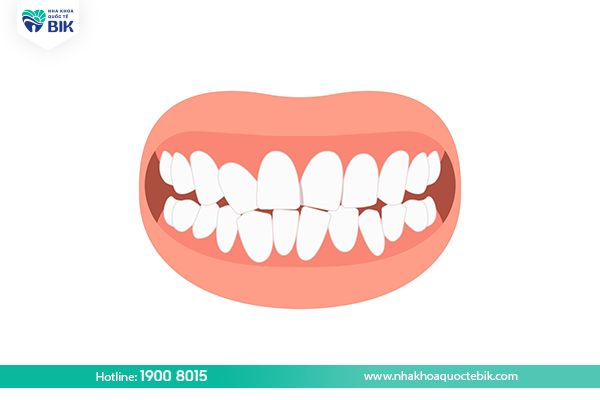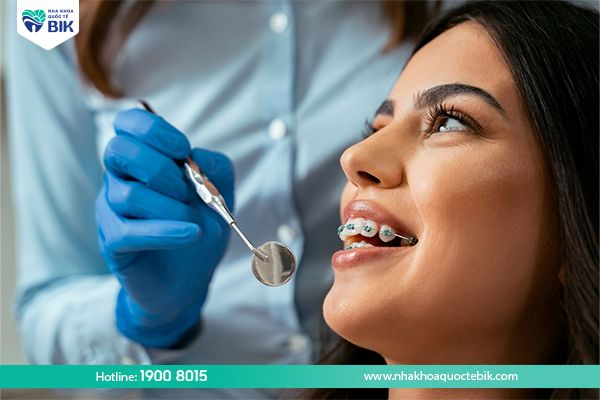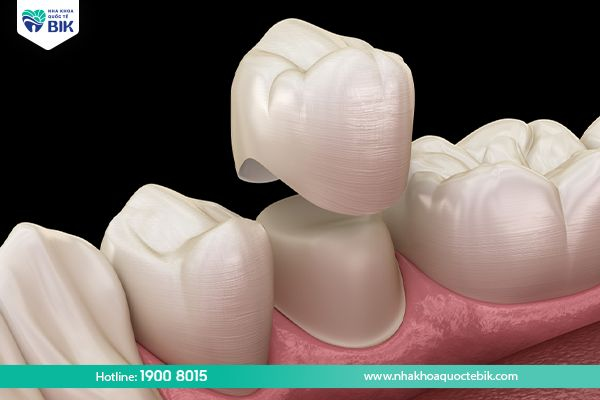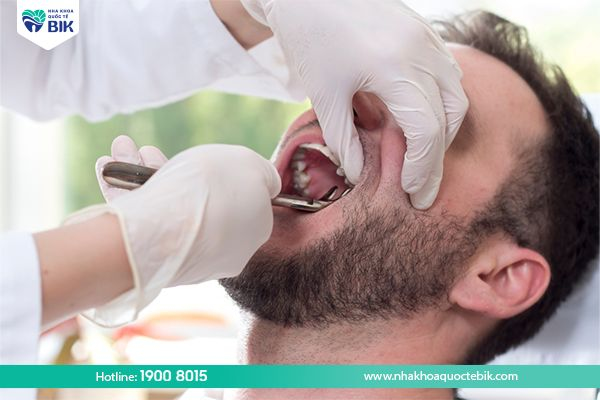Protruding teeth is a fairly common condition, often seen in children when they have just grown permanent teeth due to the impact of bad habits when they were young. If protruding teeth are not promptly corrected, they will not only affect the overall aesthetics of the face but also increase the risk of other dangerous oral diseases. At the same time, this condition also makes the chewing process more difficult, thereby affecting the digestive system.
1. What are protruding teeth?
Protruding teeth are a condition in which the canine teeth grow completely out of the jawbone due to insufficient bone volume, the direction of growth is quite diverse depending on each case. Protruding teeth are completely different from canine teeth, which bring charm and an aesthetic smile. If the protruding teeth grow out in a certain ratio, protruding teeth grow messy and unbalanced, making the smile less attractive.

2. Causes of protruding tooth
The causes of protruding tooth can be listed as follows:
– The upper and lower jaw bones develop unevenly, the jaw bone size is too small and narrow, causing the teeth to not have enough space to grow, leading to crowded, overlapping growth causing protruding tooth.
– Bad habits from childhood such as thumb sucking, tongue thrusting, teeth grinding, mouth breathing, pacifier use,… even though they only have a slight impact, in the long term can affect the tooth replacement process, causing permanent teeth to protrude, grow crowded, and become crooked when they grow up.
– Due to children having their teeth extracted incorrectly, losing their baby teeth early.
– Affected by other oral diseases.
3. Are protruding teeth dangerous?
Protruding teeth can lead to the following effects:
3.1. Affects aesthetics
People with protruding teeth often have difficulty closing their mouths completely because the teeth grow outward, thereby also losing the aesthetics of the face and smile, affecting daily communication. In addition, protruding teeth also cause jaw deviation, making the overall face unbalanced, slightly tilted under the chin or above the nose. Many people therefore no longer feel really confident when communicating and presenting in front of a crowd, affecting their work.

3.2. Affects chewing ability
In cases where many teeth are protruding on the jaw, the other teeth will also be displaced from their original position and cause an imbalance between the upper and lower jaws. This leads to severe bite misalignment, greatly affecting the chewing process and causing food not to be thoroughly ground. From there, the digestive system can also be affected.
3.3. Affects oral health
The crowding of teeth will create small and deep gaps, making it easy for food to get stuck and form tartar plaque. This condition gives bacteria the opportunity to grow and develop, increasing the risk of oral diseases such as gingivitis, tooth decay, periodontitis, etc. Over time, the teeth will become loose and even lose teeth.
4. Can protruding teeth be extracted?
Protruding teeth are usually teeth that grow on the gums and have the function of biting and tearing food, so doctors will often require other measures to preserve the teeth first. In dentistry, the top treatment principle that must be followed is to preserve real teeth, so dentists usually only extract teeth when it cannot be fixed or the patient is in a special case that requires tooth extraction such as: impacted wisdom teeth, crooked teeth, extra teeth, etc.
However, if the protruding tooth causes negative effects and is in one of the following cases, the doctor may prescribe extraction of the protruding tooth:
– The protruding tooth grows outward, creating a 3-legged position, seriously affecting the ability to chew.
– The protruding tooth is at risk of dangerous oral diseases such as pulpitis, periodontitis, etc.
– Extracting the protruding tooth to perform orthodontic techniques.
– It greatly affects the aesthetics of the face.
– The protruding tooth is the cause of the surrounding teeth growing to one side, causing confusion on the jaw.
5. Effective method to fix protruding tooth
To fix protruding tooth, the doctor will conduct a thorough examination and then prescribe one of the following methods depending on each specific case to ensure the best treatment effect:
5.1. Braces – orthodontics
Braces are the leading orthodontic method to effectively correct misaligned bites such as overbites, underbites, crooked teeth and especially protruding teeth. With this method, the braces system will be attached to the teeth to pull the teeth to the correct position on the jaw with moderate tightening force. This braces can be a wire system, brackets or advanced Invisalign clear braces.
Depending on the method you choose as well as the specific oral condition, the orthodontic treatment time can last about 1.5 – 2 years.

5.2. Porcelain crowns for teeth
Porcelain crowns are the most popular cosmetic restoration method for teeth today, bringing results after only 3-5 days of treatment. With this method, the protruding teeth will be ground down according to a certain ratio that the doctor has calculated in advance and then a porcelain crown will be placed on top.
The porcelain crown will be crafted according to each person’s tooth mold to achieve maximum precision and fit. At the same time, the color will also be adjusted to match the remaining real teeth, bringing even, beautiful, and bright white teeth. Currently, there are many types of porcelain crowns made from different materials with suitable costs so that you can flexibly choose according to your needs.

5.3. Tooth extraction
In cases where protruding teeth cause difficulty in chewing, increasing the risk of many other diseases such as tooth decay, gingivitis, infection, gum inflammation, … then the doctor will prescribe tooth extraction. Tooth extraction needs to be considered and specifically planned before performing.

6. When is the best time to treat protruding teeth?
The best time to treat protruding teeth is when the teeth are changing from 6 to 12 years old. This is when the jawbone is developing, the teeth are not really stable, so if orthodontics is performed, it will be less painful and bring quick results.
Especially if the cause of protruding teeth and misalignment is due to the jaw being too narrow, early treatment will support easy and effective jaw expansion because the jawbone is still in the development stage, still soft and not yet complete. This will create space for the teeth to grow and arrange in the correct position without having to remove any teeth.
So protruding teeth is a condition where the canine teeth grow crookedly, not in a certain proportion with the protruding teeth. The golden time to fix this condition is the period when children change teeth. If adults want to treat protruding teeth, they should consider choosing a reputable dental clinic with a doctor with many years of experience so that the treatment process is safe and highly effective.


















